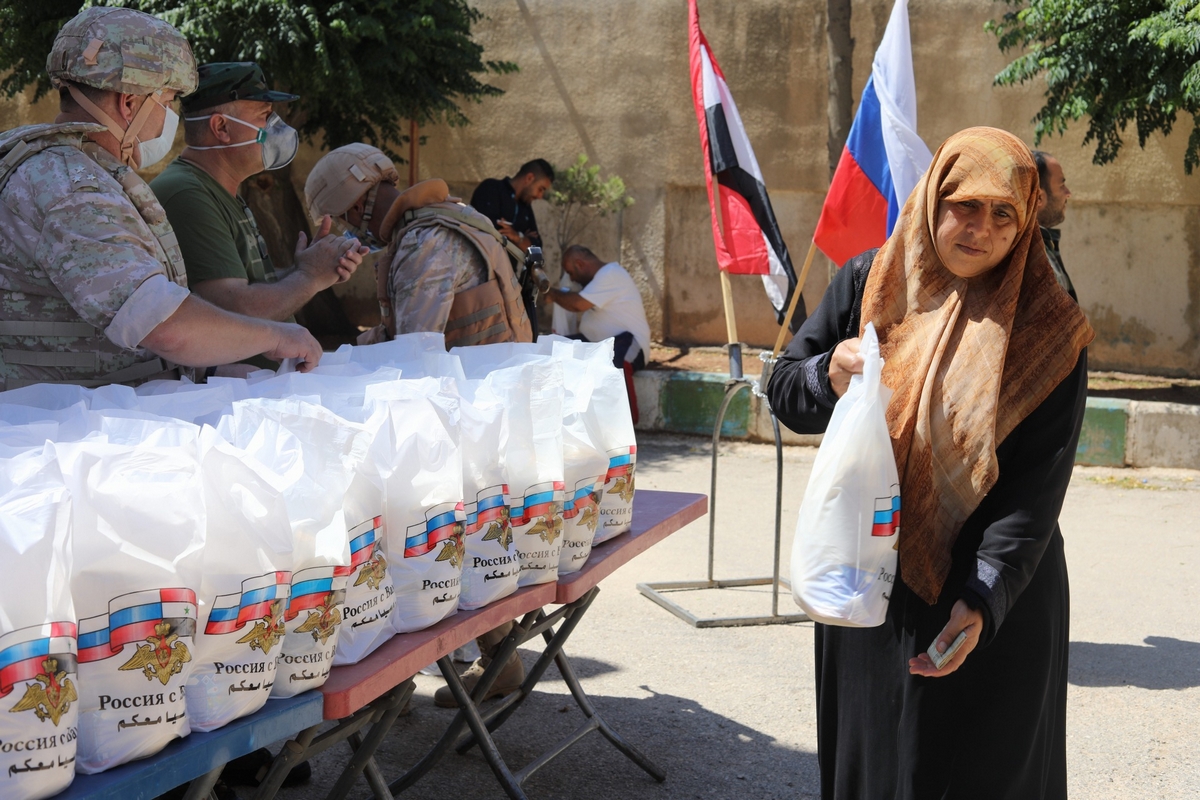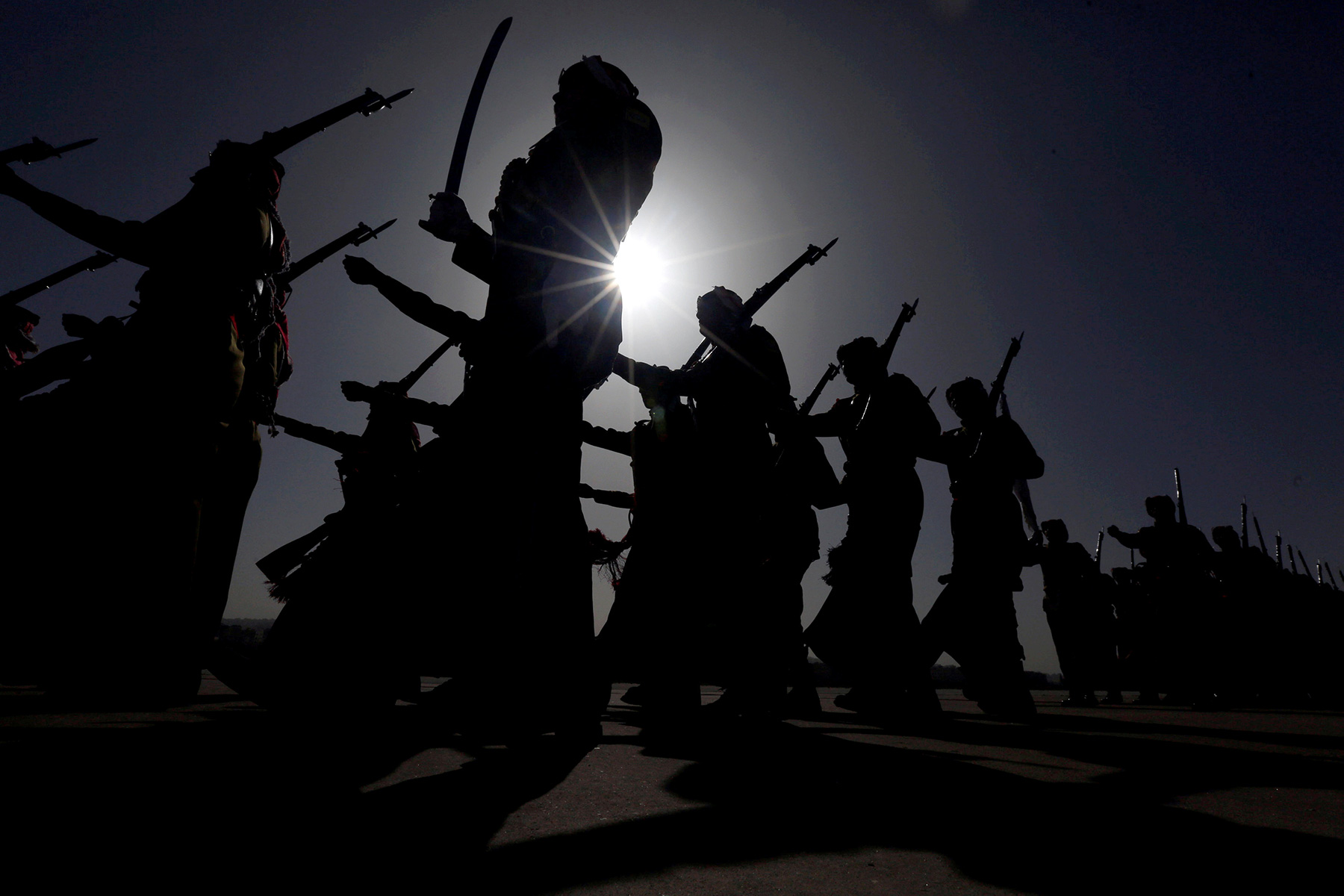There are several myths about Soviet/Russian involvement in Libya in particular and the Mediterranean in general. Unfortunately, such “political stories” are firmly rooted in the traditions of the Cold War and the post-Soviet period of geopolitical fog.
The first myth perpetuated in all the analytical efforts is that Gaddafi was a staunch ally to the Kremlin. This misreading of the Colonel has been the reason for many failures in describing the past and the present of Russia’s moves in Libya and beyond. Gaddafi was a dedicated enemy of everything communist, ready to bring the Russian connection into play as a proverbial “stick” in his troubled relations with the Americans. In doing so, he was far from original but rather following in the footsteps of many Middle Eastern politicians who blackmailed the West with the threat of “going Soviet.”
The second myth is that Moscow has historically been trying to convert North Africa and Eastern Mediterranean into the “main proletarian confession.” This particular narrative dates back to the early decades following the 1917 revolution when the imagination of a few idealistic amateurs conceived the “world revolution.” Fortunately for the Soviet Union, this romantic dream died long before World War 2; and unfortunately for the hypothetical West, the attitude remained unchanged.
The third myth is that Russia has no business to be anywhere outside of its borders. In fact, this is an attitude spread by Washington among its allies in Europe through NATO doctrines rather than a myth. The argument typically goes, “We are here because we are good” and “We are good because we say so”, while they should not be here “because they are bad” and “they are bad because we say so.” The keywords here are “because we say so.”
Now, these are the myths. What could be said of the reality?
Myths Turned Historical Reality
At the outset, Russia cast a close look at the Mediterranean during the time of Catherine the Great. At that time, the understanding was clear. If we want to a) secure the Southern border and b) trade with the world with no restrictions, we had to have access to the warm high seas. For that to happen, Moscow had to project power. Those were the days when power projection was the key to trade success. Not that much has changed.
Paul the First went a little further as he tried to establish Russia’s naval base in Malta. An old trick got in his way, though, he was stopped by repeated blows to his head.
However, the idea was quite clear. The Mediterranean and North Africa were definitely worthy of attention. The Soviet leadership was nothing if not excellent students of history, something that soon resulted in particular attention to the area. For the most part, all the Soviet Mideastern discourse could not and should not be taken separate from the Eastern Mediterranean track. Naturally, Libya was ideally positioned for the effort to project political, military and ideological power to the Eastern Mediterranean. Ideology should receive rapt attention as well. It has always been in the offering, still being there albeit under the disguise of “traditional values”. It is worth stressing that this new package for the old adage enjoys undisputed success with the traditionalist elites in North Africa and the Middle East.
The Moscow–Tripoli relations were always anything but smooth. If not for the American posture towards Gaddafi, one might say Moscow would have failed to get inside the Jamahiriya at all. Washington somehow served the cards in favor of the Kremlin, though, and Gaddafi signed a considerable package with Russia in the early 1970s. However, even this package came with a pinch of salt when Russian specialists and advisors were for months not allowed to attend their workplaces in the military units after their arrival to Libya. It was an enigma at the time, but it then became more than clear that Gaddafi kept the door open for a setback in the relations with Moscow if the situation with the West (meaning the U.S.) changed to the positive.
Something like that happened during 2004–2006. By time the Soviet Union was long gone, Gaddafi made loud concessions, and Washington started afresh with Tripoli. Immediately, Gaddafi’s contractual policies shifted in favor of the Western alternatives, like signing tremendous contracts with Italy. That was a clear sign of the times, coupled with the same old “game of options”. When several meetings between Gaddafi and the new Russian leaders took place and a few agreements were signed, this served as source of optimism in the Kremlin. This came at a time when Russia started reassessing its position in the MENA region and was in the process of defining who is who vis à vis Moscow’s newly-found ambitions. The new agreements signed between Moscow and Tripoli were perceived in Russia as a manifestation of the newly-found rapport with the rich North African country. Probably, this period, more than any time else, gave rise to the speculations about the “eternal friendship” between Gaddafi and Russia.
However, the enthusiasm was waning as it became increasingly evident that Gaddafi was more interested in the new acceptance from the United States and that Libya transited from the enfant terrible of global politics to the country welcomed in the diplomatic chambers of Europe and America. Evidently, by the time of the Security Council resolution of 2011 on Libya, Moscow’s political elite became disinterested in Libya as a possible partner, which was the reason why Russia abstained from its right of veto.
Against this backdrop, Russia entered the years 2014–2015, heralding the country’s expanded presence in the Middle East and the Mediterranean.
Facing Today’s World
It has virtually become an article of faith that Russia has become overly aggressive in its foreign policy from that time on, creating a vacuum around itself and fostering many hostile elements in the West with crippling sanctions from the former “partners” being “displeased” by Russia’s modus operandi. This is one way of looking at the issue. Let’s try to adopt a different approach, one closer to Moscow’s optics.
It all started in Ukraine and with the Crimea. After the 2013 Euromaidan and the ousting of President Yanukovitsh, there was a well-founded apprehension about Sevastopol’s fate and the ill-disguised intentions of the new political elite in Kiev to turn this naval base over to NATO. Anyone with some experience in international politics could deduce this was a huge red line for Russia. With Sevastopol, Russia could lose its ability to operate in the Mediterranean and project its power to the Middle East. This aspect is strangely absent in the Western (and sometimes Eastern) discourse. Or, maybe, this is not that strange.
This fact was exacerbated by the intense anti-Russian campaign in the former Soviet Republics on the Western border. It genuinely hurt Russian feelings. We all remember the unbelievable amount of money Russia, then part of the Soviet Union, invested in these same republics, and this “post-factum animosity” went against all beliefs of the Russian people. This implies reactions among ordinary citizens to whom political elites in Moscow had to really pay attention.
The Yugoslavia crisis also raised another principal issue: when “they” do it, it has to be the struggle for democracy as half of Europe could be bombed amid happy dancing around the “equality campfire;” when “we” do it, they call it transgression, annexation and you name what. Unjust. Definitely unjust. And what would you call denying Russia its right of influence and its freedom of presence in the regions which Moscow considers its areas of interest while hailing the U.S. for doing the same? Discrimination. Definitely, discrimination.
Hence, the go-alone (China is out of account here) trajectory in the Middle East and beyond as well as the genuine belief that “our cause is just and we will prevail.” Actually, this is not so different from the American discourse. The scale of confrontation between the two countries may well come as the result of this similarity.
A lot is said about the “ring of enemies” and the “motherland under siege” narrative, which allegedly mirrors the Kremlin’s international policies and influences its Middle Eastern discourse. This is a dangerous misreading of the situation. This is an American narrative rather than a Kremlin narrative. As any counterproductive policy, it leads to Moscow exploiting this pressure and having a good response from the grassroots level. All attempts at depicting it otherwise are dangerous delusions that result in mistakes when formulating strategies.
As far as the 140 million people living in Russia are concerned, we have to account for a next-to-total support of the Kremlin’s political course. This is what matters to decision-makers. The situation may gradually be changing now, but the inertia is still strong.
A Change of Mind
Now, if we put all this together as the basis for our analytical attempt, we might work out a better understanding of Russia’s foreign policy approach to Libya and the Eastern Mediterranean, which is a crucial part of the nation’s Southern track.
As mentioned before, Russia has lost interest in Libya for practical reasons. For some time, the country was considered a Western fiasco; and as such, it was apodictically left for the West to deal with. This is especially true for the period since 2015, when Syria has stolen all the available effort. The Syrian file left a lot of room for speculation. Many “specialists” posited that Russia entered Syria to make itself indispensable as a party to the regional mediation process and, which is much more exotic, to alleviate the Crimea fallout. Perhaps, nothing could be farther from the truth. Reasons for such argumentation are clear as there was a need to project the success of the U.S. sanctions policies and to show to the civilized world that the courageous stance of Washington and its allies against the Russian threat was a success. The result of this narrative was more than misleading. In fact, the Russian political elite, mainly oriented towards domestic reactions (remember the support for the PLO in the 1970s)[1], maintained that Moscow was not at all intimidated by Western activism. Contrary to this original plan, Moscow successfully used the anti-Russian campaign to its own ends, openly accusing former “partners” of inadequacy.
The decision to engage in the Syrian file was based on several factors, and none of them was truly perceived by the West. The first and the most important was terrorism. For Russia, Syria was too close to the borders for comfort to allow terrorist activities to go unimpeded. It was imperative not just to put an end to groups like ISIS and JN but to eliminate the most active terrorists physically so that they would not be able to return to their homeland. Following the disastrous invasion of Iraq in 2003, the United States was not trusted to do good. No doubt, the second reason was the support of the regime, and this is not to mean in in the sense “we like Assad, let him stay.” This was rooted in discouraging the notion of forceful replacement of political rulers per se. The old adage stipulating “what was done by force would be undone by a greater force” was at the forefront of the reasoning. The third factor has, of course, to account for the military presence in the Mediterranean. To lose naval facilities that facilitate operations in the area was absolutely unacceptable, especially since the reasoning seemed sound—if the Americans have the right, then we also have the right. Hard to argue, isn’t it? Then, there was also the display of loyalty to the long-time ally and the necessity of defending Orthodox Christians, bearing in mind that the discourse of Orthodoxy has been a significant part of the domestic political narrative.
However, the Syrian engagement served as a catalyst for the change of status towards Libya.
During the Syrian crisis and as a result of military successes (with occasional fiascos, for sure), the outlook on the Middle Eastern paradigm became more and more “militarized” in the sense that it started to look as though we could achieve by force more than we would achieve by word “in this neck of the woods”. As a result, the military started replacing diplomats in a lot of venues. The argument was clear – there is still a lot of terrorist activity, so we need to be proactive.
With the tangible results in Syria, the Libyan option started to look more and more doable. However, there still was reluctance to engage on the state level. The position of the Kremlin was clear. As we do not know what will come as a result of the Libyan kaleidoscope, we will hedge our risks by talking to everybody without engaging on the part of anybody. If there were a private initiative, we would not interfere. This is plausible deniability which turned out to be not so convincing in the fall of 2019 as world news agencies readily tied the so-called Wagner to the Russian government. Still, it is not a state endeavor and should not be considered as such. At the end, it is definitely private and not very impressive.
During the initial period of official engagement in Syria and the unofficial one in Libya, Russia faced several challenges that it learned to cope with, except for that of Turkey. Ankara became active in the Middle East some time ago, recently arriving in Eastern Mediterranean. This was probably something new for the “front-line” Mediterranean countries of Europe, but not for Russia. Russia had to deal with Turkey through all its recorded history. Nothing changed in principle. It is still the interests of one country and the interests of the other. However, the context is different. Turkey remains a NATO member and, as such, enjoys the support of other member-states.[2] On the other hand, both countries enjoy certain levels of economic cooperation and are reluctant to sacrifice it, at least for now. There are even “optimistic” voices in Russia saying that Turkey is ready to leave NATO and cut relations with the U.S. to foster a new alliance with Russia. This is an interesting albeit unrealistic opinion.
In reality, the two countries have been dancing in close military proximity in Syria, now having to adjust to each other yet again over the frontline in Libya. Both countries have an impact on the U.S. involvement, both negatively, as in Syria (playing hoax on the Kurds and seeding discord in the tribal structure of the Levant), as well as positively, as in Libya (facilitating a new possible track to solution, however improbable it may look).
Still, Moscow appears to take a very cautious approach to the GNU, noting the new circumstances amid which Haftar finds himself. The closeness of Abdelhamid Dbeiba to Ankara is not a secret, while Haftar’s reluctance to cede his domain to anybody is also known. It seems Moscow is waiting for the final outcome, hardly being optimistic of the election’s prospects. If there are no elections, then the unity of the country is questionable and who is to say where the balance goes? The remark of Vershinin pronounced on the margins of the Berlin 2.0 that evacuation of foreign fighters from Libya should be approached cautiously, is telling.
Moscow’s approach to Eastern Mediterranean is based on the new contextual reality. Mediterranean seems to be in transit from a Eurocentric to a Mideastern character. Recently, the leading Gulf nations have shown their keen interest in what is happening in the region. From Moscow’s perspective, this means that the “liberal democratic” construct of the Mediterranean will increasingly be subjected to the stress-test by the “desert warrior” political routine. In this context, Russia feels more comfortable as a historically proven all-road political vehicle, capable of navigating traditional waters of no-man’s land of the Middle East. It might be too optimistic but definitely not without merit. The region is changing, and Russia that replaced the shackles of the socialist ideology of the past with the potent weapon of traditional values feels itself capable of not only participating in this change but also of driving it.
1. The Palestine Liberation Organization was considered a terrorist group, but for the Soviet people, they were freedom fighters worthy of international support. This legitimized the Kremlin’s decision to approach Arafat. A similar thing is taking place now.
2. Mind NATO’s position towards Turkish incursions into the Syrian territory in 2012 and 2013, where Rasmussen depicted Turkey as a suffering party.








